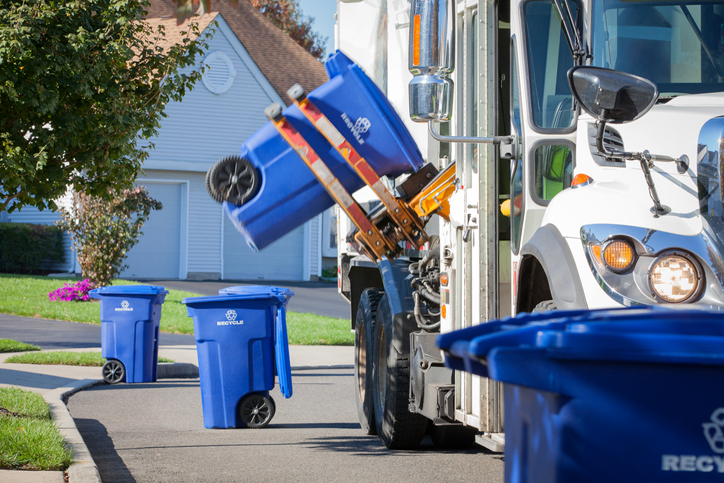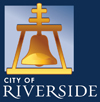Curbside recycling keeps recyclable materials out of landfills. Recycling turns materials that would otherwise become waste into valuable resources. It's good for the earth and good for you!
The internationally recognized symbol for recycling includes three arrows moving in a triangle. Each arrow represents a different part of the recycling process, from collection to re-manufacture to resale.
For items that can’t go in your bin (like those listed below), visit the County of Riverside website to find recycling locations near you.

Keeping recyclable materials out of landfills is good for the earth and community. The following recyclable materials may be placed in your blue recycling barrel:
| Paper | Plastic |
|
|
| Glass | Metal |
|
|
| Polystyrene | |
|
|
Improperly discarded household hazardous wastes and bulky items have the potential to cause physical injury to sanitation workers, contaminate septic tanks or waste water treatment systems and present hazards to children and pets.
There are many free disposal options available to residents regarding household items that cannot be disposed of in the regular trash or recycling barrels.
The following items are considered Household Hazardous Waste (HHW) and CANNOT be placed inside of your brown trash or blue recycling barrel:
| Household Hazardous Waste |
|
Ordinary recyclables (paper, plastic, glass, metal, Styrofoam) may be disposed of in any blue barrel. Other recyclable materials, such as used oil or tires, require alternative disposal methods. There are many resources (not sponsored by the City of Riverside) available to you for the disposal of recyclable materials.
This list is provided as a public service and is not an endorsement of these companies or their services. The City is not responsible for any errors or omissions in this listing.
The following locations offer alternative recycling options for items not permitted for disposal in your blue recycling or brown trash barrels.
|
Automobile Part Recyclers |
|
Battery Recyclers |
|
Bulky Item Recyclers |
|
Cell Phone Recyclers |
|
Computers and E-Waste Recyclers |
|
Construction Materials Recyclers |
| Charitable Organization Recyclers |
| Goodwill |
|
| Salvation Army Thrift Store |
|
| Eyeglass Recyclers |
| Lenscrafters |
|
| Sears Optical |
|
|
Fluorescent Light Bulbs |
| Green Waste Recyclers |
| Agua Mansa (Robert A. Nelson) Transfer Station |
|
| Grocery Bag Recyclers |
| Stater Bros |
|
| Vons |
|
| Hazardous Waste Recyclers |
| County Household Hazardous Waste Facility |
|
|
Ink Jet Cartridge Recyclers |
| Mixed (Intermingled) Recyclers |
| Cash 4 Cans |
|
| JN Grease Service |
|
| Recycling Service Center |
|
|
Needles/Sharps Recyclers |
|
Tires Recyclers |
|
Used Oil/Filters Recyclers |
Electronic Waste - a broad category of waste comprised of computer monitors, TVs, and electronic devices including, but not limited to: CPU/computer towers, printers, audio and video cassette players/recorders, telephones, answering machines, cell phones, CD players, stereo equipment, smoke detectors, hearing aids, and fax machines. These items are prohibited from burial at landfills because their components might damage the environment due to high heavy metal content and other hazardous waste components.
Household Batteries - including but not limited to single-use alkaline batteries such as AAA, AA, C, D, 9V and button cell; rechargeable nickel-cadmium, nickel-metal hydride, and lithium batteries. Rechargeable and single-use batteries both contain toxic and corrosive components that must be managed properly. Batteries can no longer be disposed of in regular trash. They can be recycled and made into new batteries.
Waste Lamps - the bulb or tube portion of an electric lighting device including, but is not limited to, fluorescent, high intensity discharge, neon, mercury vapor, high pressure sodium and metal halide lamps and may contain toxic heavy metals or other hazardous chemicals and must not be thrown away in the trash.
Mercury Containing Equipment – including thermostats, mercury switches, non-automotive mercury switches, dental amalgam, pressure or vacuum gauges, thermometers, dilators and weighted tubing, gas flow regulators, etc.
Aerosols – including containers with material remaining in the container, including those due to a clogged nozzle, damaged valve, or loss of propellant must be managed properly. Empty household aerosol containers (emptied to the maximum extent practical under normal use) are NOT regulated and may be disposed of as regular refuse.

